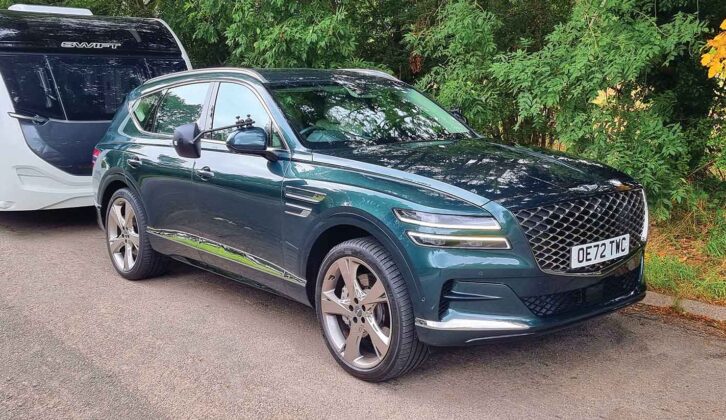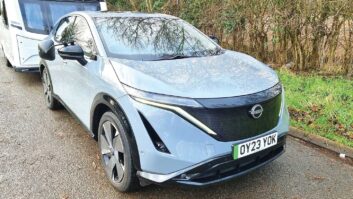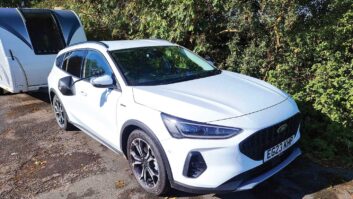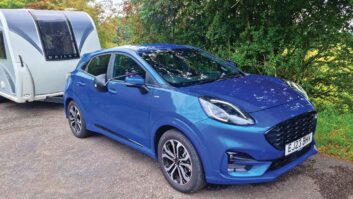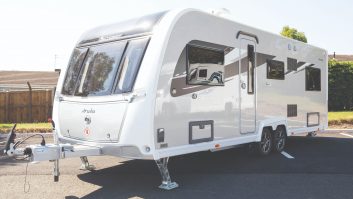The Genesis GV80 is an upmarket Hyundai spin-off, intended to take on the likes of Lexus and Mercedes-Benz. The GV80 is the company’s large SUV.
We’re carrying out a review of the Genesis to see if it has what it takes to compete with other luxury SUVs – we want to know how well this petrol-powered car tows. You can also check out our best used tow car guide if you’d be interested in seeing our pick of the standout pre-owned options on the market.
Towing ability of the Genesis GV80 2.5T Luxury AWD
Take a look at the GV80’s spec sheet and you’ll see it has most things you might look for in the best caravan tow cars. The kerbweight is well over two tonnes, the maximum towing figure is very high, and four-wheel drive promises surefooted towing in all weathers.
This is a powerful car, with 304hp and 311lb ft of torque. But all that power comes from a turbocharged petrol engine with no hybrid assistance, so it’s rather thirsty.
We matched the Genesis to a 2024 Swift Challenger Grande 650L Exclusive, with a MiRO of 1652kg. The GV80 had no trouble pulling the big Swift up to speed, although the 2.5-litre turbo engine doesn’t have the surplus of performance of some rivals.
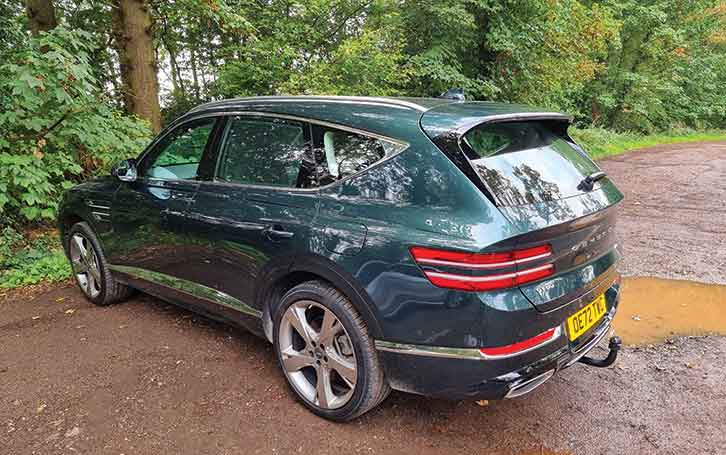
Hill starts are no trouble at all. The electronic parking brake holds car and caravan reliably and we could pull away smoothly on a 1-in-10 slope. The road was dry when we carried out our test, but the GV80 is four-wheel drive, so damp roads should not pose a challenge.
Head out onto the motorway and the car feels at home. Its high kerbweight and long wheelbase make for great stability. Even in disturbed air around HGVs and coaches, there was hardly a twitch from the Swift.
You can cover long distances stress-free with the Genesis, thanks to its strong performance and stability at speed, something which is always important when hitting caravan speed limits. Yes, some of the best 4x4s for towing are quicker still, but we’re happy with the GV80’s acceleration.
Fuel economy? Now that’s a different matter, and one we’ll return to later.
Solo driving the GV80 2.5T Luxury AWD
As a luxury SUV, you’d expect the GV80 to ride comfortably. You’d be disappointed, certainly around town. The suspension thumps into potholes, especially at the rear, not helped by the 22-inch alloys.
Head out of town and the ride improves, although it does feel a tad floaty over dips and crests. Throw in some twists and turns and the Genesis handles neatly for such a large and heavy car.
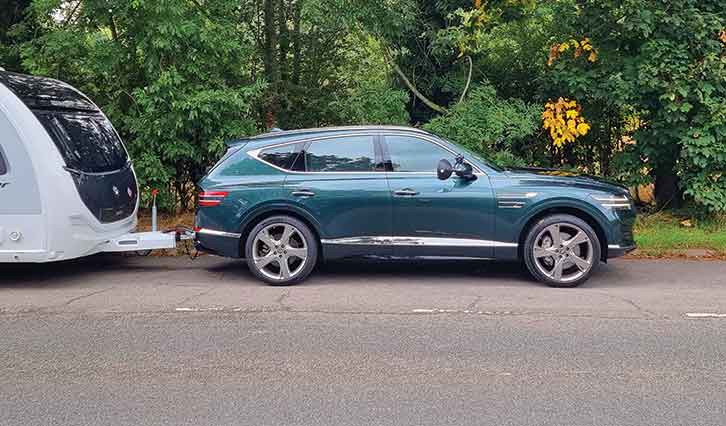
The eight-speed gearbox is very smooth, although it hesitates before changing down in ‘comfort’ mode. Switch to ‘sport’ and it is quicker to respond, with more weight to the steering and tauter suspension.
Whichever mode you are in, B-roads are not the GV80’s natural habitat. Motorways are where the Genesis is really at home. The ride is at its most comfortable and the cabin is very quiet, aside from a little road noise on some surfaces. You really do need to watch the speedo, as you could be fooled into thinking that you are driving slowly.
The Genesis GV80 interior
The GV80 is available with five or seven seats, and we tested the seven-seater.
You wouldn’t want to spend long in the third row. Although Genesis has provided air vents and cupholders in the back, there is very little headroom or legroom.
It’s possible to make more space for passengers’ knees by sliding the middle row forwards, but adults will still find the roof pressing on the back of their head.
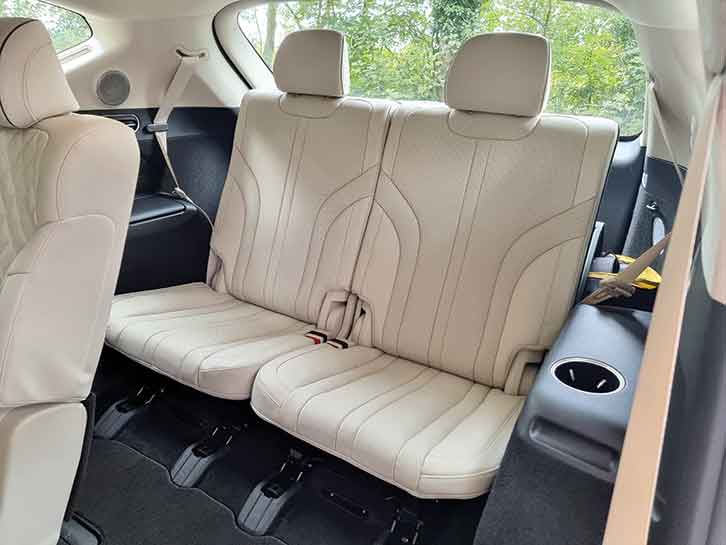
Middle-row passengers will be far more comfortable. The cabin is wide enough to seat three without much elbow-rubbing. There’s a slight hump for the transmission tunnel, so there’s room for everyone’s feet, and headroom and legroom are plentiful.
There are air vents between the front seats, and separate air-con controls. There are a couple of USBs and a 220V socket, too, although oddly, this is a two-pin.
In front, you don’t sit as high as in some SUVs, but finding a comfortable driving position is easy with seats that adjust electrically. Our test car had the comfort seat pack – an electric cushion extension, ventilation, heating and massage function.
Aside from some cheap-feeling plastic on the rotary controller, the cabin is finished to a standard that won’t disappoint drivers who are used to Audi or BMW interiors.
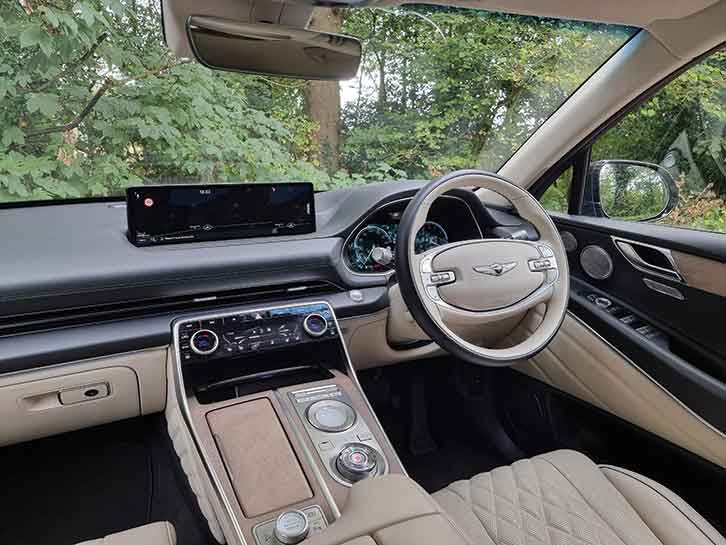
With all seven seats upright, boot space in the Genesis GV80 is tight, but there’s lots of room for luggage with the third row lowered into the floor.
Buying and owning a Genesis GV80
You have a choice – buying the car online, or through one of a handful of dealers.
At £66,625 for our Luxury spec car, the GV80 is competitively priced with established rivals. But being a new name in the premium car market means that resale values aren’t predicted to be very strong.
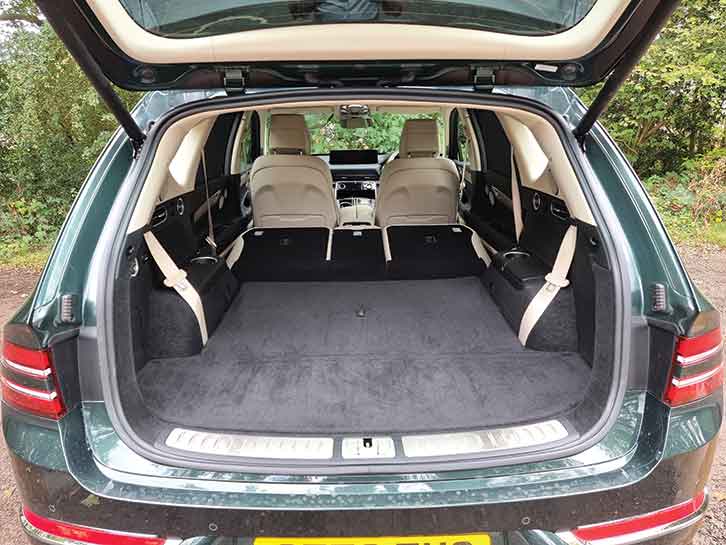
Running costs will be high – blame the petrol engine. We saw around 33mpg on a solo motorway drive, dropping to just 20.2mpg while towing the Swift.
Carbon dioxide emissions are high, too, which means that company car drivers will be paying a lot of tax.
The GV80 is extremely well equipped, in terms of tech, luxury and safety equipment. The car also has a five-star rating from the safety experts at Euro NCAP.
Verdict on the Genesis GV80 2.5T Luxury AWD
The Genesis GV80 is rather let down by its thirst and the disappointing ride comfort, especially around town. It’s quite cramped as a seven-seater, so that will be a consideration if you’re looking for a family car for towing.
But otherwise, there’s a great deal to like. Stability is excellent, the car is generously equipped and the cabin is luxurious. As an early effort from the South Korean brand, it bodes very well for the future.
See what I’ve made of another vehicle from Genesis, the Genesis Electrified GV70 Sport, a model that provides quality, comfort and plenty of power.
Technical spec
- Price: £66,625
- What Car? Target Price: £66,625
- Retained value after three years: 47%
- Kerbweight: 2145kg
- 85% of kerbweight: 1823kg
- Gross vehicle weight: 2825kg
- Max towing limit: 2722kg
- Gross train weight: 5612kg
- Towball limit: 182kg
- Towball and electrics: £1499
- Boot size: 735 litres
- Payload: 680kg
- Test conditions: Dry
- Engine size: 2497cc
- Power (hp)/rpm: 304@5800rpm
- Torque (lb ft)/rpm: 311@1650-4000rpm
- Official combined economy: 30.5-31.4mpg
- Towing economy: 20.2mpg
- CO2 emissions: 241-248g/km
- First year car tax: £2220
- Second year car tax: £570
- Insurance group: 47
- Euro NCAP rating: 5/5
Alternatives to the Genesis GV80
The Audi A6 Avant combines strong performance with excellent economy if you have the chance to recharge the plug-in hybrid at home. Alternatively, the Volkswagen Multivan 1.4 eHybrid 218PS Style DSG is worth considering if you want a towing option that can be used all year. The BMW X3 M40d is an SUV which should provide caravanners with a high-level of towing too.
If you’ve enjoyed reading this article, why not get the latest news, reviews and features delivered direct to your door or inbox every month. Take advantage of our brilliant Practical Caravan magazine SUBSCRIBERS’ OFFER and SIGN UP TO OUR NEWSLETTER for regular weekly updates on all things caravan related.
Technical Specifications
| Engine Size | 2497 cc |
| Kerbweight | 2145 kg |
| 85% KW | 1823 kg |
| Towball Limit | 182 kg |
| Maximum Towing Limit | 2722 kg |
| Power | 304 bhp |
| Torque | 311 lb ft |
| Offical MPG | 30.5-31.4 mpg |
| Towing MPG | 20.2 mpg |
| CO₂ | 241-248 g/km |
